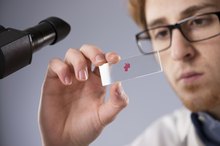What Are the Symptoms That May Occur From Not Drinking Enough Water?
Your body consists of more than 70 percent water. Water helps the brain and kidneys to function properly -- it also helps with digestion, supports muscle function, boosts your metabolism and your immune system. In addition to not drinking enough water, water can be lost through sweat, vomiting, diarrhea and using the restroom. Many problems may occur when you don't drink enough water, including heatstroke, seizures and possibly death.
Dehydration
The first complication of not drinking enough water is dehydration. Symptoms of dehydration may include thirst, sticky or dry mouth, tongue, lips and skin as well as a mild headache. Symptoms of severe dehydration may include lethargy, inability to use the restroom or producing dark-colored urine, dizziness, confusion and chest pain. In addition to not drinking enough water, dehydration may occur due to certain medical conditions such as diabetes. Older adults and children under 6 years old may be at a higher risk of dehydration.
Body Temperature
Why Is Water Important in a Balanced Diet?
Learn More
Your body uses water in order to cool yourself down as well as to keep important internal organs from overheating, especially after exercise or any strenuous physical activity. When you don't drink enough water, your internal air conditioning unit may not work properly which may result in a wide range of symptoms, including feeling too warm or too cold, heat cramps, rapid pulse, feeling lightheaded or dizzy and excessive fatigue. A lack of water may also cause heat stroke, a potentially life-threatening condition.
Chemical Imbalance
Your body needs vitamins, minerals and electrolytes in order to function. Sodium and potassium, for example, help each cell in your body to communicate with each other. Water also helps deliver oxygen to your organs, clears out toxic waste products, boosts energy and lubricates your joints and bones. Without water, your body's vitamin, mineral and chemical composition goes "out of whack" and may result in symptoms such as grogginess, abnormal heart rate and seizures -- as well as serious health complications such as low blood volume, kidney failure, loss of consciousness and shock.
Other Considerations
How Much Water Should Weight Lifters Drink?
Learn More
Not drinking enough water may make you think that you're hungry when you are really thirsty. It may also impact your digestive system as well as make you constipated. The National Institutes of Health recommend drinking an average of 48 to 64 oz. of water a day. Don't wait until you are thirsty before you drink water as this may mean your body is already dehydrated. The organization encourages to drink water throughout the day as well as with every meal.
Related Articles
References
Writer Bio
Susan Diranian is a writer for various online publications and magazines, specializing in relationships, health, fashion, beauty and fitness. She holds a Bachelor of Arts in English with a concentration in nonfiction writing and editing.









